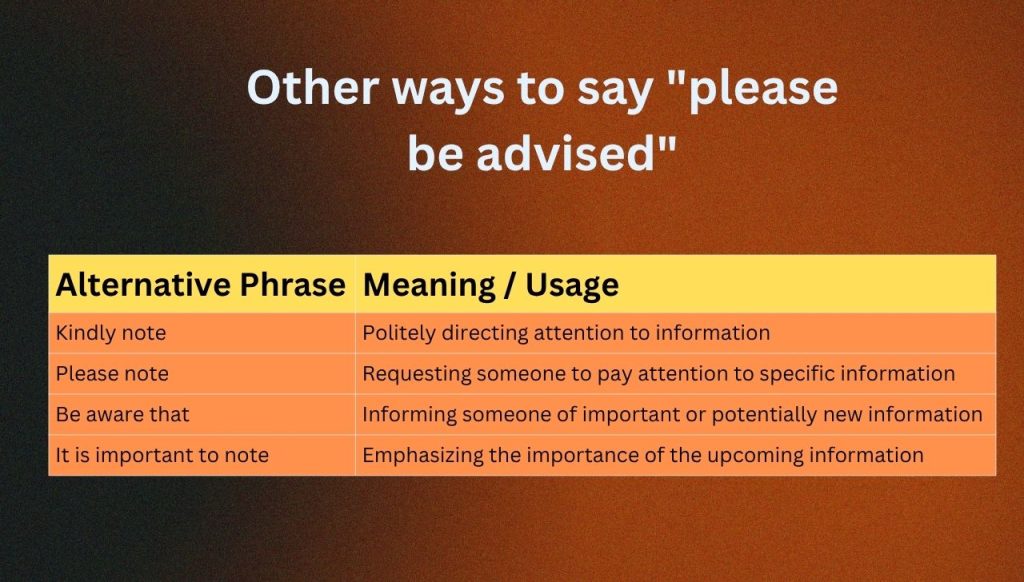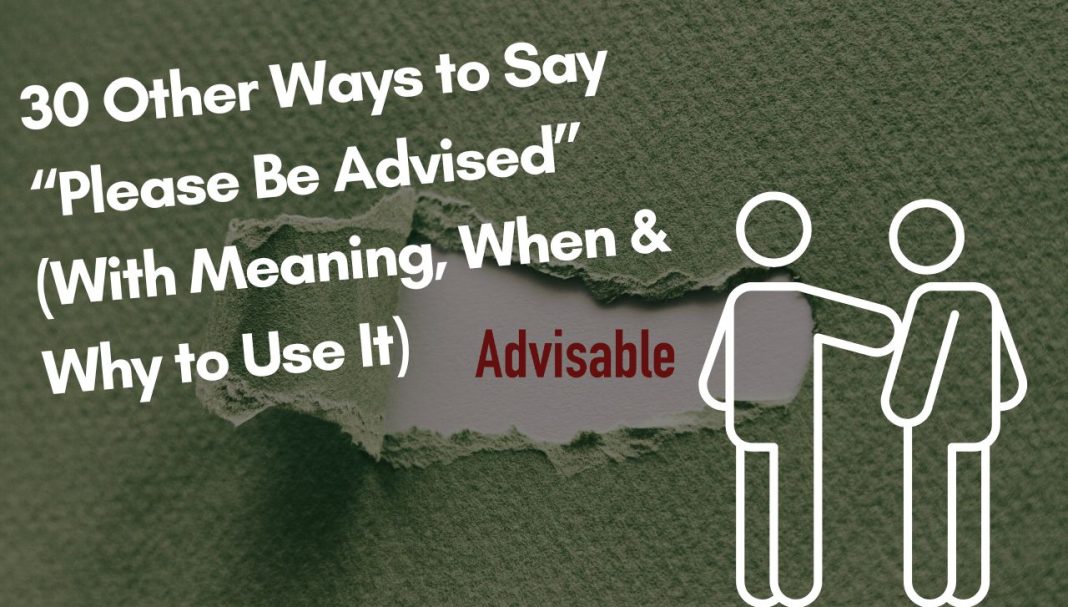“Please be advised” might sound polished and professional, but let’s be real—it’s also a little stiff. Whether you’re drafting emails, memos, or formal notices, this phrase can feel overused or robotic. Want to sound authoritative without sounding like a robot? Good news: plenty of alternatives keep things clear, polite, and on point. In this guide, we’ll break down 30 solid substitutes—explaining what they mean, when they fit, and why you’d use them instead. Because sometimes, just tweaking a phrase can shift the whole tone of your message—for the better.
“Please Be Advised” – What Does It Mean?
Let’s cut through the formality. When someone says “please be advised,” they’re saying:
“Hey, just so you know…”
“Heads up…”
“FYI…”
“Be aware that…”
It’s a formal signal that something important is being shared. The tone? Often a little stiff, maybe even cold. It’s like the email version of someone putting on a suit just to tell you your parking meter expired.
Is It Wrong to Use?
Not at all. It’s perfectly acceptable in legal, administrative, and official communication. But here’s the thing—because it sounds impersonal, it can come off as distant or overly formal in casual emails or everyday business writing.
When Should You Use “Please Be Advised”?
There’s a time and a place. The phrase works best when:
- You’re communicating formally, especially in legal or corporate settings.
- You’re notifying someone about a policy change, a decision, or a potential consequence.
- You want to emphasize that the information is essential and official.
Examples:
- “Please be advised that your account will be suspended if payment is not received by June 15.”
- “Please be advised that the office will be closed next Monday due to renovations.”
See the pattern? It’s used when issuing a warning, setting a boundary, or making an announcement with weight.
Why Say “Please Be Advised” at All?
Great question. You could just say “just so you know,” right? Sure, but here’s why “please be advised” still shows up:
- Formality: It adds a tone of seriousness or professionalism.
- Clarity: It signals that the following info isn’t casual—it’s noteworthy.
- Tone management: It’s a neutral way to say something that could otherwise sound harsh.
If you’re not a lawyer or sending a government memo, there are many fresher, friendlier, and more engaging ways to say the same thing.

Other ways to say “please be advised”
| Alternative Phrase | Meaning / Usage |
|---|---|
| Kindly note | Politely directing attention to information |
| Please note | Requesting someone to pay attention to specific information |
| Be aware that | Informing someone of important or potentially new information |
| It is important to note | Emphasizing the importance of the upcoming information |
| For your information (FYI) | Providing information that might be useful or necessary |
| Just a heads-up | Giving a casual warning or reminder |
| Please take note | Asking someone to remember or consider the information |
| Allow me to inform you | Introducing new or significant information politely |
| This is to inform you that | A formal way to begin sharing important information |
| I’d like to bring to your attention | Highlighting something that needs focus |
| Kindly be informed | Politely alerting someone to a piece of information |
| Let it be known | Stating something that should be acknowledged |
| You should know that | Advising someone of something potentially useful or necessary |
| Please be aware | Alerting someone in a respectful way |
| You are hereby informed | Formal and official notification |
| Take into account | Advising someone to consider specific information |
| Keep in mind | Suggesting someone remember a point or fact |
| We would like to inform you | Formal, polite expression for giving information |
| It is worth noting | Indicating something is important or relevant |
| It should be noted | Formal way of pointing out relevant facts |
| Just so you know | Informal way to pass along helpful or relevant information |
| You might want to know | Offering information that may be of interest |
| As a reminder | Pointing out something already known or previously communicated |
| In case you didn’t know | Mentioning information the person might have missed |
| For your awareness | Providing information so the person is informed |
| You may wish to note | Polite suggestion to pay attention to something |
| May I point out | Courteously drawing someone’s attention to something |
| Please keep in mind | A reminder to consider the information shared |
| It’s good to be aware that | Informal suggestion to take note of something |
| Just bringing to your attention | Informal, helpful reminder or information sharing |
Conclusion
Swapping out “please be advised” isn’t just about variety—choosing words that suit your tone, reader, and the moment. The correct phrase matters whether you’re keeping things formal or making your communication feel more natural. With these 30 alternatives in your toolkit, you’ve got options that strike the perfect balance between clarity and courtesy. Use them wisely, and your writing will instantly feel more human and effective.

Grammar Nerd, ESL Trainer, Low-Key Comma Crusader
Daniel has taught English for over a decade, from small community classes in Oaxaca to bustling university halls in London. He has a knack for turning even the driest grammar points into relatable, real-life language tools—think fewer red pens, more real talk. He co-founded Grammation to make grammar less gatekeeper-y and more global. When he’s not decoding sentence structures, he’s probably hiking with a paperback novel or adding unnecessary hyphens for fun.
“The rules of grammar should empower people—not trip them up.”


